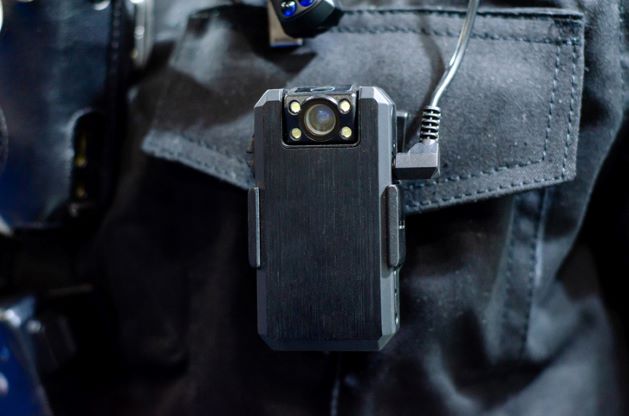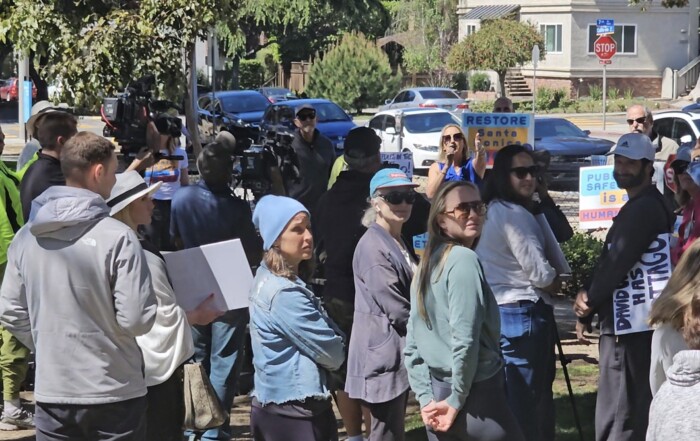On Monday evening, the Culver City council took up a number of items, including two consent items that would keep the city moving toward meeting housing goals established by the state.
One other consent item, C-5, was pulled from consent by Vice Mayor Yasmine-Imani McMorrin. The item was to accept a $200,000 matching grant for the installation and use of new police body cameras. Objecting, McMorrin acknowledged that, “Folks know, I do support a divest-invest model,” she said. “A lot of the data regarding surveillance tools like body cameras in law enforcement have shown it does not decrease any use of force; it doesn’t decrease police violence – in fact, 2022 was the largest year for police murders across this nation.” She says this remains the case despite the fact that there has been widespread adoption of body cameras and other training tools in the aftermath of many widely publicized events of police abuse and murder.
“A lot of people have succumbed to death after encounters with police,” she added. “I don’t see the data that supports body cameras as a tool to reduce the loss of life. The one thing that is statistically proven to reduce the loss of life is reduced contact with police.” She later added, “These metrics and tools that are intended to reduce the loss of life had not been statistically shown to do so.” McMorrin was citing a highly researched article from the journal “Criminology and Public Policy” in making her statements. The piece audited 70 cities nationwide to develop their conclusions.
Before inviting the Interim Chief of Police to comment, Mayor Albert Vera countered with, “My understanding is this is just another tool for accountability more so than anything else. [Looking at Interim Chief] We hold you accountable. And in my opinion, this is a great tool to get first-hand experience of what’s going on out there in the field.”
Interim Chief of the Culver City Police Department (CCPD) Jason Simms stated, “We’ve had body-worn cameras in our police department since 2017. We’re very proud of the success of our program and believe deeply the cameras provide, among other things, a level of accountability and transparency of our officers and our actions as we interact with our community.” He added, “They provide a non-biased account of our contacts with our community, which can be used for criminal prosecution, investigations stemming from citizen complaints, to improve our training within the organization, and much more.”
Simms also said the CCPD has decreased reports of use of force incidents by 27 percent since 2019. He attributes the decrease to better training and internal policy improvement but also credits accountability measures like the body cameras.
Councilmember Freddy Puza weighed in, saying “The results have been mixed, at best. In some cases, it does shine a light on police misconduct. But it’s more often that incidents are just being recorded, so it doesn’t necessarily lead to accountability.” Then, turning to Interim Chief Simms, Puza asked, “If we move forward with this, what would be eliminated in order to make room for this in the budget?”
Simms explained that the current body-worn camera program requires a maintenance and service cost of about $115,000 a year. He said that cost would be replaced by the cost of the new program the grant would help fund when implemented, which didn’t seem to answer the question.
Puza said that he hopes programs that remove police contact with the homeless and those facing mental health crises should receive greater support and that he can’t see himself supporting the grant at this time.
Councilmember Göran Eriksson recalled a League of Cities committee on police reform he served on in 2020 and said most of the elected officials from around the country he participated with strongly supported adopting body cameras in their communities as an important tool for transparency and accountability. He seemed surprised by the opposition to the cameras, seeming to cite how many impressive and high-level mayors were on the committee with him that were in support.
Resident Stephen Jones, calling into the meeting, was critical of body cameras. “The presence of body cams didn’t prevent a CCPD officer from shooting an unarmed man in the back just a few months ago.” And after criticizing the size of the ever-growing police budget, which at $52 Million Jones says is 24 percent higher than just five years ago, he added, “It’s far past time to dispense with the fiction that throwing more money at the police makes us any safer.” He later asked, “Do you feel 24 percent safer?”
In council chambers, Jannee Lennox, an African-American woman, also spoke against the grant. Saying of body cameras, “If anything, it continues to traumatize the community – people that look like me,” she said. She added, “If the footage actually does get out, there are no laws in place to hold police accountable, even when they are visibly doing harm.”
“Plain and simple: cameras do not prevent deaths at the hands of police,” said Nancy Barba, who called into the meeting over WebEx. “The only thing that helps is to reduce interactions with the police.”
Despite evidence from McMorrin, Puza, and pleas from the public, the council passed the motion to accept the grant application 3-2.
Photo by artas
Stay informed. Sign up for The Westside Voice Newsletter
By clicking submit, you agree to share your email address with Westside Voice. We do not sell or share your information with anyone.








